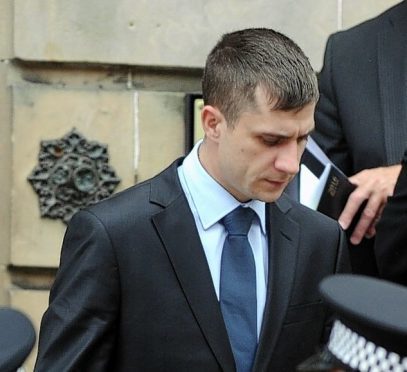A former airman who subjected his wife to years of verbal abuse while stationed at RAF Lossiemouth has been fined.
Andrew Marshall, 29, admitted to yelling obscenities at his partner during a vile campaign that spanned almost three years, between 2010 and 2013.
It was only when Marshall’s wife, Rachel, left him last year that she felt able to report his conduct to the police.
Marshall admitted a charge of conducting himself in a disorderly manner by shouting, using offensive language and committing a breach of the peace when he appeared at Elgin Sheriff Court yesterday.
The court heard he would “often” scream directly into the face of his frightened spouse.
Fiscal David Morton said: “The accused would shout at swear at his wife, calling her offensive names, and lost his temper at other family members too.
“He would often scream into the face of Rachel Marshall, using offensive language to describe her.”
The couple eventually went their separate ways last July, when Marshall was transferred from Lossiemouth to RAF Leeming in North Yorkshire.
Shortly after that, Mrs Marshall decided to inform the police about her husband’s behaviour.
Representing the accused, solicitor Robert Cruickshank said there had been “acrimony and discord” between the pair.
But Mr Cruickshank added that, since separating, relations between the couple have improved.
He said: “My client accepts his responsibility for this, and accepts that, on occasion, he lost his temper where his wife was concerned.
“However, they have now been able to agree meaningful contact, where he can see their children although they now live in the central belt.”
Mr Cruickshank confirmed that Marshall was “no longer attached to the air force”.
Sheriff Olga Pasportnikov noted that the offences took place “some time ago”, and fined Marshall £500.
She said he may have faced steeper punishment had the couple not managed to reconcile their differences to an extent.
Marshall, who now resides at 1 Hill Street in Lossiemouth, was staying in married quarters at Bishop’s Court near the airfield during much of the period in question.
However, court papers noted that individual offences were also recorded “elsewhere in Scotland”.
